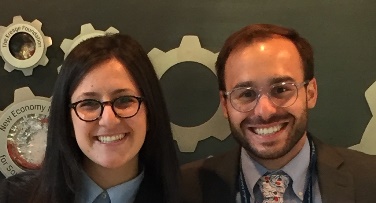
A new Wayne State University School of Medicine student organization aimed at helping medical students become medical innovators hosted its first meeting and brainstorm session.
Medtech Thinktank was founded by fourth-year medical students Leedor Lieberman and Matthew Madion to promote innovation, design and entrepreneurial ideas in medicine.
"We are really hoping to ignite students' passion for innovation and to motivate them to be change-seekers in the medical field," Lieberman said.
Both students have undergraduate degrees in biomedical engineering, and quickly found in medical school that while many classmates have similar engineering or design backgrounds, others have never formally learned how to brainstorm, develop a problem statement, or know what design requirements are and how to develop meaningful ones.
"Matt and I have worked on many projects in the past and have found a love for questioning how we can improve a system that is already in place, especially when it means improving outcomes for our patients," Lieberman said. "We felt that many of our peers would equally enjoy asking these questions and working to devise creative solutions to advance patient care."
The duo had already collaborated on various engineering-related projects during undergraduate studies. After gaining a broader and more concrete understanding of the need for one invention, CathAware, they pitched the prototype at the Henry Ford Innovation Institute's Frugal Innovations Challenge on June 14, and won second place.
They soon surveyed their classmates for interest in learning engineering and design concepts, and found the majority would feel more comfortable pursuing research and entrepreneurial projects if a formal curriculum in scientific thought and engineering design were provided. Medtech Thinktank was formed to teach interested students innovation concepts while working on solving problems inherent in medical systems.
They shared the survey results with School of Medicine leadership, who Lieberman emphasized have been extraordinarily supportive.
"We feel that Detroit is an amazing city for us to pilot this project. From our experiences on the wards we recognize the importance in accounting for patients' disparities and obstacles in their care in order to develop meaningful solutions to health care," Lieberman said.
"We want group members to feel like they can be free to pursue their own ventures, but also continue to learn design, problem-solving and engineering thought processes," Madion added.
The group held its first brainstorm session Aug. 29, posing this year's challenge question: "How can we motivate our patients to be active members in their health care?"
"We were really excited about the turnout, mostly because everyone who showed up was clearly excited. We already have a diverse group, with a lot of the students bringing a high level of expertise. Everyone is going to be able to contribute from a teaching perspective," Madion said.
Through monthly instructional meetings and additional brainstorming and social meetings, members will spend six months exploring the question's root problems, formulate evidence-based research that justifies its significance and work toward conceptualizing a solution, culminating with a design expo.
"Regardless of students' backgrounds, we are hoping to work together to teach students how to develop meaningful questions and answers to common medical problems," Lieberman said. "Students are able to develop solutions in whatever area of medicine interests them - education, policy, technology - which is why we made the challenge question so vague."
Medtech Thinktank welcomes anyone associated with the School of Medicine to join. Email llieberm@med.wayne.edu or mmadion@med.wayne.edu for more information.